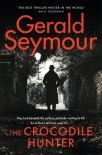The Crocodile Hunter by Gerald Seymour (english novels to improve english txt) 📗

- Author: Gerald Seymour
Book online «The Crocodile Hunter by Gerald Seymour (english novels to improve english txt) 📗». Author Gerald Seymour
Because the raincoat was a size too large for him, the sleeves amply covered his wrists. They hid the watch on his left wrist, and also the metal attachment fastened on his right wrist from which a fine chain ran to the handle of his briefcase. The concession that he should be permitted to take home sensitive documents had been made on the very strict guarantee that the chain would always be in place when he travelled. The practice was frowned upon by those of senior rank but was allowed and none of the rest of the hordes who packed into Thames House each morning were afforded a matching privilege, except perhaps the Assistant Deputy Director General, AssDepDG, and the handful of men and women at the heart of authority in the building. He had owned that briefcase – a present from Vera, then his fiancée – for 34 of the 38 years he had worked for the Security Service, which had the Latin title of Regnum Defende. The task of defending the kingdom was, generally accepted by those who cared to know of such matters, about as bloody difficult – that day, yesterday, tomorrow, each hour of each week in each month – as it had been at any time since he had joined the Service with the rank of a junior clerk. As he turned out of his own street, left behind the last of the trees that were coming into bud and might if the cold eased soon be in blossom, Vera would be closing the front door behind her, leaving her with only the presence of their mutually beloved youngster – a Norwegian Forest cat asleep on a kitchen chair. Vera worked in a small gallery in Motspur Park that sold watercolour paintings from the previous century. She, also, those months ago, had expected to retire, had rescinded her notice, had stayed on.
Jonas had a season ticket. He would catch a train from Raynes Park that would take him to Waterloo in 26 minutes. The journey would take the same time as it had more than three decades earlier when he and Vera had scraped together the deposit on their home: they had not moved since and the train timetable had not altered. He could usually rely on getting a seat on that train, in the fifth carriage, and might have to use his elbows, but most mornings he could squirm through the waiting passengers on the platform. There were at least half a dozen other commuters from his street arriving at the station at the same time but he acknowledged none of them. Familiar faces would be in the carriage, some of whom he had travelled alongside for a quarter of a century, but he would keep his head down and rely on the journey to provide an opportunity for reflection. He knew the developing landmarks along the route, through Wimbledon where the stampede started, and then Clapham, knew every new building sandwiched into minimal space, and although the carriage was always overheated he would keep his mackintosh on and the right sleeve would mask the wrist attachment to the chain of tempered steel and the old frayed briefcase that carried no label and most certainly not the insignia of EII in faded gold. He was anonymous, unknown. Jonas Merrick carried huge responsibility on his rather bowed shoulders, and he wore no uniform and none of those squashed around him would have realised that they were pressed close to an individual on whom responsibilities and burdens weighed heavily . . . His job was to keep them safe, and the threat was greater each day and never diminished . . . It was good to have some quiet time to think, put himself in their minds, anticipate their moves.
He pulled up, parked the van on the grass verge.
Behind him he heard whispers, nervous giggles and gasps of anticipation. He switched off the engine, opened his window. Silence nestled around them.
On the files he was Cameron Jilkes, aged 25. The photographs would include ones of him as a child, then as a teenager at school, and one captured almost four years before at an airport departure gate. To his one-time friends, he had been Kami al-Britani. To his mum, whom he had loved, who had been a source of comfort in the years he had been away, to whom he had not spoken nor written since he had taken the plane out, he was Cammy.
He took a cigarette from the pack in his breast-pocket. The packet showed images of rampant cancers that were supposed to deter smokers. Where Cammy had been and what he had seen and what he had done, and the price he had paid, the ravages of terminal illness were a low priority. Behind him, the group he had driven





Comments (0)